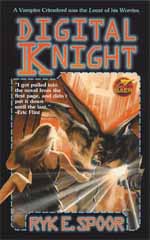Although billed repeatedly as a novel on its front and back covers, Digital Knight is, in fact, a collection of previously unpublished short stories which – as far as I can tell – have only been lightly touched up (if at all) to form the “novel”. I’m going to spoil significant chunks of the first short story (although not its plot), because – otherwise – it would be impossible to discuss this book in any meaningful way. The rest of the book is left blissfully mysterious.
END NOTE ABOUT SPOILERS
Neither the exceptionally poor cover art nor the somewhat cliched back cover blurb drew my attention to Digital Knight. Not even the effusive cover quote praise from Eric Flint would have made me pass over the eight bucks Baen was asking for it.
What did make me pick it up was the fact that Ryk E. Spoor had written it. For those of you who don’t already know, Ryk posts regularly around Usenet under the handle Sea Wasp. As the friendly Wasp, I’ve been acquainted with Ryk for almost exactly a decade now – during which time he’s distinguished himself as a person of singular creativity, insight, and intellect.
So, if Spoor had written it, I wanted to read it. Once a copy put in an appearance at my local bookshop, I snatched it up and stuck it on my reading list. Which brings us here.
As noted above, Digital Knight is more a short story collection than a novel. It contains a cycle of short stories, all focusing on the character of Jason Wood: A private investigator who finds himself plunged into a world of urban fantasy.
Reading this book is fascinating, because you can see Spoor growing as a writer right before you eyes. The earlier short stories are plagued with a lot of problems: The plotting is awkward and contrived, and its strength is further sapped by the fact that Spoor seems to be making an attempt at stylizing his prose by adopting the hard-edged, slightly ironic feel of a PI novel. Unfortunately, he doesn’t quite get there and the result is jarring and off-putting.
Worst of all, the early dialogue can be actively painful. People just don’t talk the way Spoor has them talking. The thing I noticed most was that his characters weren’t using contractions, but this was really just the tip of the iceberg: A lot of factors combined to make the dialogue jarring and unbelievable.
But, like I said, as you read further you see the book improve dramatically before your eyes:
The dialogue begins to flow naturally, and the characters develop rich, distinct voices. The stiff, uncomfortable prose resolves itself into a unique, effective voice – still rough around the edges, perhaps, but clean and entertaining nonetheless. And once Spoor finds his rhythm, he starts playing some powerful beats: There are bits that I found myself reading out loud, and I only do that when the wordsmithing becomes remarkable.
Meanwhile, the plotting is shedding its awkwardness step-by-step, until you eventually find yourself compulsively turning page after page, drawn inexorably along by Spoor’s action and world-building.
In short, the book is well worth pushing through its weak start: The early stories have some diamonds in the rough to offer you, and the book starts to really pay off with “Photo Finish” (which starts around page 90). Shortly thereafter Spoor throws a twist at you which makes you realize that he’s just been toying with you all along, and then he follows it up with a revelatory punch that will send you reeling. You can practically hear the starter pistol going off as the novel starts racing.
There are a lot of treasures hidden away in the nooks of this book, but one thing which is delightful right from the beginning is what I’m going to call, for lack of a better term, the “genre-awareness” of the characters. When Jason Wood runs into vampires he has his moment of disbelief… but then he realizes he’s acting just like the characters he makes fun of in the horror movies and gets down to the business of using his collected knowledge of horror and fantasy to his advantage. Not everything he tries works – because, of course, myth isn’t the same thing as reality – but that just sells it: Wood is a skeptic in an unskeptical world. But he’s not Dana Scully dense: Once he’s seen the evidence of something being true, he accepts it as truth and moves on.
In grading this book I am left in something of a quandary: I would rate the early material at roughly a C+ (average-to-mediocre material with the occasional reward). For the later material – and greater bulk of the novel – however, I would probably give an A- (highly rewarding with only the occasional, minor flaw). In a completely non-linear fashion, I’m going to average that out to a B+ (notable, fun, and well worth your time).
GRADE: B+
Ryk E. Spoor
Published: 2003
Publisher: Baen Books
Cover Price: $7.99
ISBN: 0-7434-7161-X













